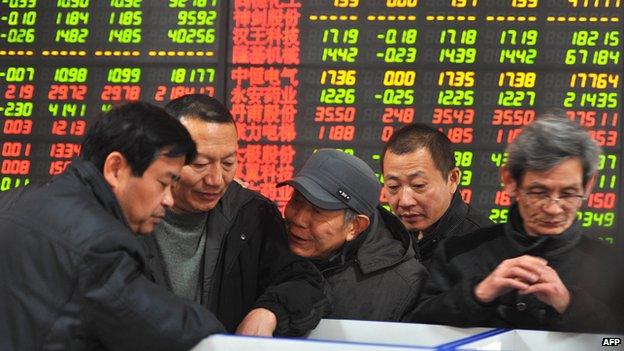Chinese shares slide despite government support
- Published

Mainland Chinese shares have fallen further despite more measures from the government aimed at stemming the sell-off in the volatile market.
Over the weekend, brokerages and fund managers vowed to buy stocks, helped by a state-owned margin finance firm, which in turn would be helped with liquidity from the central bank.
Despite this, the Shanghai Composite closed down 1.29% at 3,727.12.
That comes despite signs of heavy money flows into Shanghai's blue chip stocks.
State media said 21 brokerages had put more than 128bn yuan ($20.6bn; £13bn) into a stabilisation fund to meet their weekend pledges to support the market.
About 57 mutual fund houses were also reported to have started buying equities using 2.16bn yuan of their own money.
However, the significant downtrend in the market is raising concerns about whether policymakers have the ability to stabilise the market.
Local reports said more than 200 Chinese-listed firms would halt trading of their shares, in an attempt protect themselves from the falling stock markets.
But Bernard Aw, market strategist at trading firm IG, said he expected authorities to continue to "implement stronger measures until the stock market stabilises".
In Hong Kong, the Hang Seng index closed down 1.03% to 24,975.31.
Samsung shares
The rest of Asian markets experienced mixed fortunes, with some recovering losses seen on Monday on fears that Greece would exit the eurozone after the "no" vote in Sunday's referendum.
Investors were awaiting the Greek government's new proposals to be unveiled at an emergency eurozone meeting later in the day.
Japan's benchmark Nikkei 225 closed up 1.3% to 20,376.59 after falling more than 2% on Monday.
The euro was down to 135.28 yen, but still far above a six-week low of 133.70 yen hit on Monday.
In South Korea, the benchmark Kospi index ended down 0.7% at 2,040.29 - marking a three-week low.
Shares of Samsung Electronics finished up 0.8% despite the tech giant's earnings guidance falling short of expectations for the second quarter.
Australia's S&P/ASX 200 index ended 1.9% higher at 5,581.40 after the central bank decided to leave interest rates unchanged at a record low of 2%.
The decision by the Reserve Bank of Australia was widely expected after it had cut rates in May.